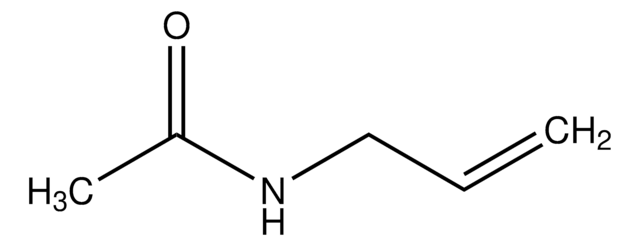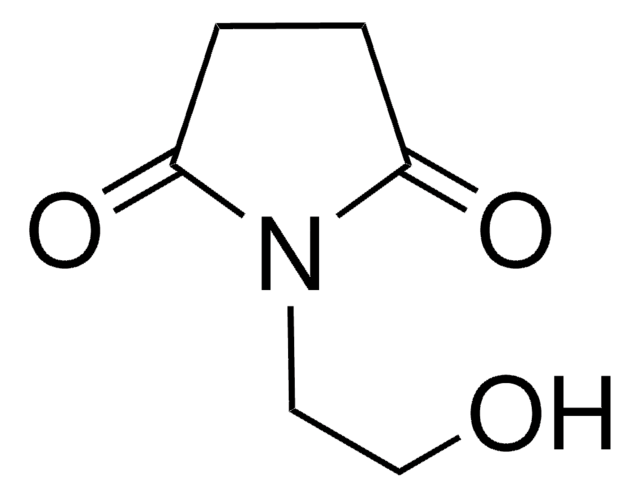M35304
Methyl chloroformate
99%
Synonym(s):
MCF, Chloroformic acid methyl ester
About This Item
Recommended Products
vapor density
3.26 (vs air)
Quality Level
vapor pressure
4.8 psi ( 20 °C)
Assay
99%
autoignition temp.
905 °F
refractive index
n20/D 1.387 (lit.)
bp
70-72 °C (lit.)
density
1.223 g/mL at 25 °C (lit.)
storage temp.
2-8°C
SMILES string
COC(Cl)=O
InChI
1S/C2H3ClO2/c1-5-2(3)4/h1H3
InChI key
XMJHPCRAQCTCFT-UHFFFAOYSA-N
Looking for similar products? Visit Product Comparison Guide
Related Categories
Application
MCF can also be used:
- To activate 3-acylpyridines for nucleophilic addition with alkynyltin reagents to form 2,3-disubstituted 1,2-dihydropyridines.
- Chloroesterification of terminal alkynes to form β-chloro-α,β-unsaturated esters.
- As an electrophilic reagent to mediate the reaction of pyridine with lithium dialkyl- or diarylcuprates to form 4-substituted 1,4-dihydropyridine derivatives.
- To convert nitronates into methoxycarbonyl nitronates.
Signal Word
Danger
Hazard Statements
Precautionary Statements
Hazard Classifications
Acute Tox. 2 Inhalation - Acute Tox. 4 Dermal - Acute Tox. 4 Oral - Eye Dam. 1 - Flam. Liq. 2 - Skin Corr. 1B
Storage Class Code
3 - Flammable liquids
WGK
WGK 2
Flash Point(F)
50.0 °F - closed cup
Flash Point(C)
10 °C - closed cup
Regulatory Listings
Regulatory Listings are mainly provided for chemical products. Only limited information can be provided here for non-chemical products. No entry means none of the components are listed. It is the user’s obligation to ensure the safe and legal use of the product.
FSL
Group 4: Flammable liquids
Type 1 petroleums
Hazardous rank II
Water insoluble liquid
ISHL Indicated Name
Substances Subject to be Indicated Names
ISHL Notified Names
Substances Subject to be Notified Names
JAN Code
M35304-500ML:
M35304-VAR:
M35304-100ML:
M35304-5ML:
M35304-500G:
M35304-100G:
M35304-5G:
M35304-20ML:
M35304-BULK:
Certificates of Analysis (COA)
Search for Certificates of Analysis (COA) by entering the products Lot/Batch Number. Lot and Batch Numbers can be found on a product’s label following the words ‘Lot’ or ‘Batch’.
Already Own This Product?
Find documentation for the products that you have recently purchased in the Document Library.
Customers Also Viewed
Our team of scientists has experience in all areas of research including Life Science, Material Science, Chemical Synthesis, Chromatography, Analytical and many others.
Contact Technical Service












